#both with characterisation and visuals
Text
So I saw Dune 2 the other day and obviously I loved it but I have so many thoughts on why the look and characterisations of the Harkonnens (and especially Feyd) actually took a lot of the complexity and interest out of the characters and the house in general.
Like I've been saying it since the first film but the decision to make them so bald and monochrome and almost alien looking really undermines the eventual point (which they do stress in the second movie) that the Atreides and the Harkonnens are the same family. There is no house Harkonnen Vs house Atreides really because they're all related and doing essentially exactly the same thing as one another (with an 'honourable' coat of paint on the part of the Atreides.)
Having the harkonnens be so visually distinct and inhuman looking muddies that point a whole lot. Like in the book Jessica, the baron and alia all share the visual tell of that copper hair and that link is so much visually weaker in the movies.
I totally understand why they did it, it's already complicated enough for the viewers to keep track of the houses and characters and the bleak harkonnens aesthetic makes that easier. Don't get me wrong, there are aspects of the look that I really like and I think it would have been great to incorporate some of that dark, brutalist aesthetic without going quite so far to dehumanise them. But yeah.
And that's without even mentioning the changes to Feyd Rauthas character that, for me, really go against the whole point of his being a foil to Paul. In the new movies theyve seemingly gone in for him being the anti-paul in that he is totally amoral and viscerally cruel and ambitious but in the books I always saw it much more as him being very similar to Paul, his fate just being what would have happened to Paul if he was put in the same position. They've both been bred for the same date, but Paul was raised by a loving family while Feyd was taken from his (more on the parents thing being changed in another post) and cared for by a pedophile, a sadist and a brother who hates him and killed his parents. That'll fuck you up for sure, and is a much more interesting point of comparison that just making him a 'sociopath'. I will explain all of this better in another post maybe.
I just feel like it was a missed opportunity to present another side of the 'young person pushed into fucked up role' thing that was flattened a lot by the edgy psychopath angle they went for. And that's without removing the poison angle from his character and making his driving motivation honour which could not be further from the truth.
Gonna have to write some fuckin fic to straighten this out that's for sure.
126 notes
·
View notes
Note
Yo, I'm writing a pre canon fic in which young fanboy Vox gets assigned as Alastor's assistant by Lilith, any tips for characterising him?
I think you have a lot of room for leeway and playing around since you're working with pre-canon, but the main points that I tend to at least personally keep around as a scaffold for writing Vox are:
He's got a Charisma modifier of, like, +4. This doesn't mean he's always suave - in fact, he's pretty pathetic around Alastor in particular! But he knows how to put on a performance that appeals to his intended audience, whether that be a customer base whose trust he's winning over, or a fellow Vee that he's trying to wrangle into behaving. He switches between ridiculous showmanship and collected CEO, and this works for him despite both personas being rife with overcompensation.
Every single one of the Vees including Vox thinks they're the only normal, reasonably-behaving person in the room, it's wild.
He's smart, he's capable, he's manipulative. He's good at knowing what people want and how to leverage that to sell them those things. The general population thinks he's #goals thanks to the image he puts forth.
He's a piece of shit that has no qualms with Valentino's behavior with Angel Dust, Velvette selling date rape drugs, or abusing his own hypnosis ability to manipulate people into buying his products (which include spyware literally advertised to voyeurs). This is part of the fun of this character!!
I think he has a lot of very fun physicality to him (as do most of the Hazbin Hotel characters), and I really recommend re-watching some of his scenes to get the hang of how he moves and interacts with people physically because you'd be surprised at how much that can add to characterization even in a non-visual format like writing.
...I also genuinely think he's kind of a horny bastard, to whatever extent and rating your story could even use that, but that's me extrapolating from his behavior around both Alastor and Valentino. It's just a fun cherry on top of the "low impulse control around Alastor" thing, because he's got so much going for him on the intelligence front that it's really funny to me when he tangibly switches to thinking with his dick.
And, of course, on the subject of Alastor in particular:
He's obsessive, and Alastor makes all of his impulse control go out the window. I started using the "Vox's One-sided Psychosexual Obsession with Alastor (Hazbin Hotel)" tag for a reason, and it's that I think it's in fact really funny how much evidence we get in canon that Vox doesn't just hate Alastor and want to dominate him, he'd also probably roll right over into the affectionately wheedling persona he uses with Valentino if Alastor suggested he'd take it well.
We don't just see Vox wanting Alastor dead, we also see Alastor telling us that Vox first asked him to join him; the torn-in-half photo of them standing together; and Vox pretty much popping a boner over Alastor getting wrecked by Adam, nevermind how manically he jumps around to get a word in before Alastor even shows his face during Stayed Gone. Even his little "Fu-uu-uuuuuck!" at the end of the song is like 50% actual despair and 50% :pleading: emoji. He wants Alastor, obviously, and I think a lot of the anger that he's projecting at Alastor in canon is specifically anger at being rejected, which is frantically covering up the fact that he is still desperately, embarrassingly into the radio deer. If Alastor won't join him, Vox has to beat him.
Anyway, I love this funky little TV. This was by no means a comprehensive guide or anything like that, but I hope it helped share at least some of my personal thoughts on writing him!
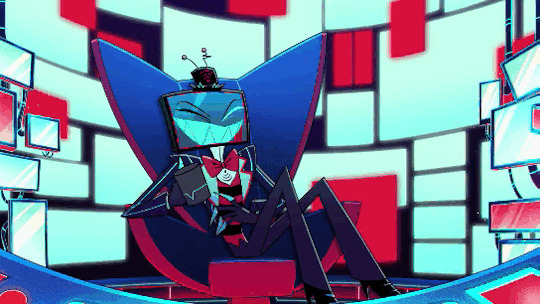
66 notes
·
View notes
Text
The Adaptation That Shall Not Be Named aside, I had an idea for an interesting way you could represent ART in a visual medium: it's cameras.
We know that, in any visual medium, what The Camera (be that literal in film or figurative in animation) chooses to show and focus on is important. Its the primary way the piece of media communicates to its audience, and the framing of a scene tells us a lot about how we're supposed to interpret it. What is on screen and how it's on screen convey authorial intent.
Take all that, and turn "authorial intent" into character expression (in this case, for ART). A conversation between Murderbot and ART that would traditionally be shot-reverse-shot becomes shot-ARTPOVshot, so both shots would be of Murderbot, but one would be from The Camera and one would be from ART. Even though the subject is the same, the difference between them could show us something about ART in the same way a reverse shot shows us something about any other character.
To me its like those shots from a monster's POV in horror movies, where one second you're with your protagonists, the next you're watching them from a far off angle between some blades of grass, shaky cam, ragged breathing. It's a classic, even a cliche, but it does the job of conveying the sense of unsafety, of Something Out There Watching Them, of monstrosity, of something feral and dangerous. All without needing to see the monster. What if that type of shot was all we ever got of a character?
(Also, in all honesty, some of my favourite meta about this series is how it's in conversation with the horror genre. ART and SecUnits being the type of characters that would be The Monster in another story, or from another perspective, is compelling to me, so i'm drawing on that a bit here. The idea of characterising but not visualising ART by taking pages out of horror monster cinematography? I just think it's neat.)
Anyway, you could also do all the sci-fi Augmented Vision stuff with it too. ART POV shots where we watch it pull up a feed tab over the camera feed and replay a section of audio, or check Murderbot's diagnostics, or look at Some Code Or Perhaps A Graph. ART POV shots that are broken into multiple feeds showing different things. ART POV shots that give you the sense of it being textually present without it being physically present.
You could use some of this for Murderbot itself, if you leant into how its drones are an extension of its awareness. You could even use it in a similar way to how Murderbot uses its narration, narrating less when it's upset as well as leaving out major details. What if, when Murderbot is tired of people looking at it or in a more vulnerable headspace, we get more drone POV shots without Murderbot in frame. It's still there, but present in a different way, behind The Camera rather than in front of it.
I think there's potential in using POV shots from ART's cameras to characterise it without visualising it in a traditional way. I think there's potential in using horror movie monster language on ART and Murderbot. I think there's potential in having the cinematography focus on what they're seeing in a way that emphasises the amount of Surveillance both of them are constantly doing.
I think there's potential in a show using The Camera as cleverly as the books use Narration.
#like can you IMAGINE.#“You dislike your function.” [subtle zoom on MB's face to see its reaction]#a human asking MB a person question and rather than the cut close up to see its reaction#the camera cuts away so its no longer even in frame#what does MB sending its GovernorModulePunishment.exe to ART look like from ARTs POV???#that one time MB shut down after ART probed too much and ART just waited until it woke up.#its just a ART cam timelapse of MB lying Unmoving for three hours#do you see the vision???? am i crazy????#murderbot#the murderbot diaries#art/perihelion#murderbot meta#stuff i made
141 notes
·
View notes
Note
gene im so glad you said this cause I haven't seen anyone else comparing it to the book as source material for like character and tone but i am So sure that if terry was alive the season would not be like this but i fear good omens fans dont realise how big a factor the lack of terry's influence is?? or like they forget that good omens was never just neilman???
ok before i go any further: i rly don't want to detract from anyone's enjoyment of the season and everything im going to say comes from a place of love for a) the original novel (& season 1 to a certain extent bc it got me back into it lol) and b) tv as a medium so like peace and love on planet let people enjoy things etc etc
but
like u said, terry's influence on the book was enormous – what makes gomens gomens is the balance of his genuine warmth and precise understanding of humanity tempered with neilman's sardonic voice and general like.....savvy approach to storytelling? i guess u could call it? anyway what rly helps the book is that it took them years to write it, passing ideas back and forth and rewriting each other's work until their voices blended seamlessly and a well structured capital-s Story was created. when i praise the book for being self-contained i think a huge part of that comes from the circumstances in which it emerged: two authors with complementary styles writing in a v particular time period where they had both the space to play with their ideas and the constraints of the novel as a storytelling format from which to craft something extremely specific.
adaptations are a tricky business and a tv version of gomens produced literal decades after the book was always going to have some unique challenges, but i don't think that's a bad thing bc the challenges could prove to be creative opportunities to take both the established audience and those new to the story by surprise. my biggest hot take here is that i don't think translating a story into a different medium means it has to follow the original narrative exactly, bc each medium has its own ways of communicating information and these structures, rules and traditions in turn inform what that story is. what matters more than following a story beat-by-beat is capturing what that story is about at its core, what themes and messages and ideas it works through and how.
all this is to say i never expected tv gomens to be a perfect reproduction of the book and if it had it been, it probably would have been worse off for it. that being said, there are parts of the book – like u said, its tone and character – that needed to have some fidelity in order to pull it off, and for the most part s1 did that bc it was still working predominantly within the bounds of the novel & its core ideas. while i did have some issues w how neilman & amazon adapted some details and characterisations, i generally rly liked s1 – it reminded me of why i loved the book and it was just generally fun to watch.
s2 was. not that fun to watch
a few positives before i go ham w the critiques:
the hair & makeup + costumes were fantastic (although i feel like s1 was slightly better re: makeup?)
the sound design & score made some of the more awkward scenes bearable and thats no mean feat imo
david & michael gave incredible performances w what they were given – michael especially managed to salvage aziraphale enough that his complete 180 didnt feel completely tonally dissonant (more on this later)
the detail of the sets is NUTS and i genuinely want to see more of hell bc of how intricate and fun the props look
i actually like gabriel/beelzebub!! their getting together montage worked for me, although they could have spent sliiiightly more time establishing what it is they like abt each other so much + why gabriel wanted to stop armageddon 2.0 so suddenly
the opening scene, although not on par w the novel's & s1's, was visually gorgeous and thematically resonant (although neilman owes me royalties for ripping it off from this shitty fic i wrote back when raphael!crowley was all the rage lol)
now w THAT being said:
like i said yesterday, the pacing was fucking awful. flashbacks are hard to work w at the best of times and the way they were used in this season felt so needless, especially the 40s one in ep 4 that takes up like 90% of the episode. in both flashbacks + present day there were scenes that dragged for no real reason, dialogue that looped back around on itself to stretch out the runtime, and weirdly enough places where there should have been character & plot work where there just,, wasn't any?? for example, maggie & nina's night locked in the café – some parts of the dialogue in later episodes made out that they'd had some rly deep conversation abt how they feel about each other or even that they'd had an affair, but that isn't clear from those scenes in the café. i'm not saying we had to see that conversation in its entirety but that there needed to be more connective details – either in dialogue or direction – that gave that part of the story coherence.
(there were pacing issues w the editing too but i don't want to jump down the editor's throats on this one bc im more focused on writing & direction issues)
the second major problem that i mentioned in my tags yesterday is the protagonist shift, which is an issue that started in s1. aziraphale & crowley are side characters in book gomens – significant ones, yeah, but still somewhat peripheral to adam (& anathema who counts as a deuteragonist imo). this works incredibly well w who they are as characters: they're Just Some Guys who happen to be involved in this epic biblical-level bureaucratic nightmare and importantly, they don't want to be in the spotlight. the arrangement was created so that they could explore what it meant to be themselves away from the Big Narrative; literally any time they get involved in larger affairs is bc the plot is alive and caught them unionising on company time. the last fucking chapter is adam (& god) being like haha u guys are alright keep it sleezy and letting them go. like. hello. neil u let them go.
but then!! tv gomens s1 does something interesting at the end w the body swapping addition that i dont totally hate – it gives aziraphale & crowley the extra bit of character work that brings them slightly more adjacent to their book selves. see i kinda view tv a/c as the younger, less settled versions of book a/c; they're still caught up in the immediacy of being key players and haven't fully realised that earth is their home. i haven't watched s1 in a while but one scene i remember rly clearly is crowley throwing all those astronomy texts in the air and angsting abt when he was an angel; i remember it bc his anguish in that scene feels a lot newer and rawer than book crowley's feelings about falling. when tv a/c do their bodyswap, it gives them the chance to land a blow against heaven/hell in a way that solidifies their allegiance to earth in a way that more closely resembles what book a/c have been abt the entire time (still adjacent, though. not parallel).
the reason why this works is that it does one final pivot to orient aziraphale and crowley as almost-main characters in a manner that makes sense in relation to a) their book selves and b) the position the tv show has placed them in. a combination of factors made tv a/c feel a lot less mature than their book counterparts but at the end of s1 they're sort of facing the same direction the book ended in, albeit through their own flashy late 2010s means.
when s2 was announced i was.......apprehensive bc to me, that felt like a satisfactory ending. i get the impression that amazon saw how wildly successful the adaptation was and was like oh shit we could make way more money out of this and neilman, having all those undead darlings that he and terry killed in the process of whittling the book into a workable novel, jumped at the chance to resurrect all those half-realised ideas. but not only were those ideas probably discarded for a reason, they've either been laying in wait for years unworked or they're new inventions, which means they weren't molded in the way that the book had been. like i said before, book gomens underwent years of rewrites and creative collaboration, and i think that process was what made it so good; s2 didn't have that. even if some of terry's ideas made it into s2, his influence is still missing bc he and neilman weren't in dialogue the same way they were in the book (and in some ways s1 bc i know terry was involved in the process of adapting gomens to screen before his death).
i don't think it's a case of newer fans forgetting terry so much as it is the context of terry's involvement being so removed from the current circumstances that certain aspects & discourses (i.e. is the s2 finale queerbaiting (no), does binge watching change the viewership experience (yes), etc etc) about the show overshadow other discussions that would usually be taking place. and before anyone says it's a case of neilman forgetting terry, i definitely don't think it's that either bc thats. yknow. wildly disrespectful. but also there are larger systems and structures at play than one writer no matter how much beef i have w him and his decisions, bc ultimately he's just one guy (a powerful and wealthy guy, but just a guy) and there's a wider cultural shift happening rn towards rehashing old stories without understanding what made them successful in the first place, and that same culture just doesn't allow for much, if any, constructive discourse analysis
so yeah
#replies.txt#Anonymous#god this is so long and rambling i hope it makes sense lmaooo#i have further thoughts on the general fic-y feeling of the season but that wasnt rly anon's question so i'll save that for another time#good omens#good omens spoilers
153 notes
·
View notes
Note
On the topic of the Halloween tropes post, I could think of at least one example of most of those tropes, but I don't play enough indie horror games to get ALL of them.
Got some relevant recommendations? Spooky Season doesn't end 'til January!
(With reference to this post here.)
Sure, with the caveat that I'm not going to specify which of the cited metanarative horror tropes appear in each example – that would be spoiling things, after all. I'm also going to skip anything super widely reviewed and focus on the more obscure stuff, so no giving me a hard time for leaving out Doki Doki Literature Club. =P
Discover My Body is at the top of this list for alphabetical reasons, but it's also a great one to kick things off with. It's a narrative point and click game where you play as a medical intern observing a volunteer as their body is slowly consumed by a fungus. Packs an amazing quantity of body horror into a very short playing time. Free to play.
eversion is one of those games where everything looks cheerful and then surprise it's really a horror game. Sort of a precision puzzle-platformer, though light on the "precision" and heavy on the "puzzle" – most of the challenge comes down to routing, not execution.
The Fall is a point-and-click adventure game masquerading as a light metroidvania, in which you play as the onboard AI of suit of powered armour, tasked with getting your incapacitated pilot to safety. At the time of this posting, it's 80% off for the next 12 hours thanks to the Steam Hallowe'en sale.
Lily's Well is, I'm going to warn you right up front, one of those "awful shit happens to a cute little girl" games. It's handled in a mostly text-based, fate-to-black fashion, though, without any of the leering that often characterises the genre. It's about a girl who's been left alone and told not to leave the house; she, of course, does not listen.
NaissanceE is a first-person exploration title of the "you wake up in some alien ruins and need to find your way out" variety. Mostly a walking sim with some puzzle elements. Free to play.
Ossuary is a surreal quasi-RPG set in purgatory, in which the gameplay is built around inventory puzzles based on gathering and equipping various sins (which are apparently physical objects). Nonlinear and kind of obtuse – don't be afraid to consult a guide.
Perfect Vermin is a gory, low-bit first person action game where you're tasked with identifying shapeshifting monsters that impersonate furniture and killing them with a sledgehammer. If the aesthetic of this one grabs you, you should also check out the developer's prior title, Swallow the Sea; both are free to play.
Please, Don't Touch Anything is sort of pushing the definition of "horror game", but my post, my rules. As the title suggests, it's a locked-room exploration game where you're presented with a mysterious control panel and sternly advised not to touch it.
Stray Cat Crossing is what you might get if you took one of those super-artsy psychological horror JRPGs and took out all the combat, leaving only the exploration and puzzle-solving elements. Content warnings for child injury (including eye trauma) and death.
The Swapper is a twin-stick puzzle game whose central mechanic involves the use of a gun which can create copies of yourself and "swap" your consciousness among them. In spite of the visuals, the horror is almost entirely psychological rather than visceral.
They Breathe is a linear survival game about a frog exploring a flooded forest. Short, minimalist, and unreasonably effective at communicating a narrative with no narration whatsoever.
We Know the Devil is a branching-path visual novel about a trio of kids at a Christian summer camp being forced to participate in a bizarre ritual where they're left alone in a cabin overnight to confront the Devil. Strong themes of religious abuse, in case that wasn't clear!
(Widely reviewed games that I considered but ultimately left off in order to avoid loading down the list with stuff you've likely already heard of include Axiom Verge, the aforementioned Doki Doki Literature Club, INSIDE, Omori, OneShot, Oxenfree, Return of the Obra Dinn, and Yume Nikki. If I've guessed wrong and any of these have escaped your radar, definitely check them out as well.)
EDIT: As a reminder for everyone trying to add their own recs, if you include off-site links in a reblog, Tumblr automatically hides it from the notes pane and nobody but you can see it. Drop those titles without links if you want your recs to be seen by anyone who isn't you or me!
#gaming#video games#video game recommendations#horror#body horror#violence mention#death mention#swearing
712 notes
·
View notes
Note
Hi! I’m pretty new to the world of Achilles and Patroclus (I read The Song Of Achilles last month) and I just saw your post about your love for them. When you said “there's just so much stuff out there about them (tsoa, hades game, the iliad, a bunch of other myths and adaptations, non fiction books, academic papers etc)” I was wondering if you could touch on the other myths and adaptations part maybe? I’m not exactly sure where to begin there but I would appreciate any guidance you could give!
Oh boy I don't know where to start either because there's a LOT. I don't want to overwhelm you so I'll just list a few key myths and adaptations off the top of my head:
Adaptations
So as far as adaptations go, I will include works where both Achilles and Patroclus show up and that are inspired by the Iliad.
Hades Game: I'm pretty sure you're already familiar with this, just mentioning it just in case!
Aristos the musical: it's a musical as the name suggests, and it revolves around Achilles and Patroclus' lives from Pelion all the way to Troy. It's really lovely and has made me emotional on numerous occasions and I love revisiting it every so often! It also has a Tumblr account: @aristosmusical
Troilus and Cressida: this is Shakespeare's take on the Trojan War and it's quite interesting, not really faithful to the Iliad but offers a sort of different perspective on the characters and the events that led to Hector's death.
Achilles (1995) by Barry JC Purves: it's a short stop motion film using clay puppets, it's on Youtube and it's only 11 mins and I think it's worth a watch! I find it very compelling visually and any adaptation where Achilles and Patroclus are lovers is a plus in my book 🫶
Holding Achilles: this is an Australian stage production by the Dead Puppet Society, I really enjoyed it and I found it an interesting blend of TSOA and Iliad Patrochilles, which also featured some cool new elements that I hadn't really seen before. It used to be free to watch for a while but now I think you have to pay to watch it, there's more info on their website.
The Silence of the Girls: a novel by Pat Barker, it's a take on the events of the Iliad mostly through Briseis' eyes, I personally didn't really like the book or the characterisations but hey both Achilles and Patroclus are in it so it might be worth a read.
There are some other novels I've heard of where Achilles and Patroclus appear (A Thousand Ships by Natalie Haynes, Wrath Goddess Sing by Maya Deane) and also a TV show called Troy: Fall of a City but I haven't read/watched them so I can't really rec them
Myths
Most myths revolve around Achilles, there aren't that many with Patroclus I'm afraid, but here are some of my favourites:
Achilleid by Publius Papinius Statius: this is an epic poem about Achilles' stay on Skyros disguised as a girl and his involvement with Deidameia. It's interesting but I'd personally take the characterisations and events in it with a grain of salt because Romans were notorious for their unsympathetic portrayal of Greek Homeric heroes but it's still a cool thing that's out there and free to read online.
Iphigenia at Aulis: a tragedy by the ancient Greek playwright Euripides, it's basically the dramatised version of the myth of Iphigenia's sacrifice in Aulis which predates the Iliad, there are many obscure versions of this myth but Euripides' sort of updated version is my favourite, I will never shut up about this play!! Lots of a nuance and very interesting portrayals of Achilles, Agamemnon, Menelaus, Clytemnestra, Iphigenia and pretty much everyone in there, well worth a read.
Lost plays: there are several plays in which Achilles appears but that have been lost or survive only in fragments, but two of my favourites are Euripides' Telephus and Aeschylus' Myrmidons. Telephus takes place before the Trojan War, while the Greeks are on their way to Troy. I really like Achilles' characterisation in the fragments that remain and also the fact that he was already renowned for his knowledge of medicine and healing despite how young he was. The fragments that survive from Aeschylus' Myrmidons I think are fewer but the play was extremely popular at the time it was presented to the public and it sparked a lot of controversy re: Achilles and Patroclus' relationship and who tops/bottoms so I think that's kind of funny lol.
There are lots of other obscure little myths about Achilles that I've picked up by reading various books, papers and wiki posts on the matter and that are just too numerous to list here, but what I will mention and that I think concludes the myths section of this post pretty neatly is that the Iliad and the Odyssey are not the only works about the Trojan War that were written, merely the only works that survived. The rest of the books in the Epic Cycle have been preserved either in fragmentary form or in descriptions in other works, and I think the Epic Cycle wiki page is a good place to start if you want to get an idea of what each of those books contained.
I hope this helped! 💙
#patrochilles#achilles#patroclus#the iliad#homer's iliad#if I remember anything else I'll probably add to this post but I think that should be enough for now#there's just! so much stuff!!#happy reading/viewing/listening 😁
46 notes
·
View notes
Text
Kaiser's characterisation and the flashback's position in the timeline
Chapter 243's official English release is available, and it's the most insight we've had into Kaiser (and Ness's dedication to him) since they've been introduced. So forgive my rambling.

My initial impression of Kaiser in this chapter was that Rin has a rival for the mantle of edgiest teenager. Did that little diatribe cut his tongue on its way out?
More seriously, have a lengthy analysis of both the timeline and Kaiser's character under the cut, featuring references to Christianity. Years of Catholic upbringing are finally paying off /s
Timeline
I always get hung up on event dates when it comes to Blue Lock (cos I write post-canon stuff and like to keep the lore consistent). It seems like the Bastard Munich try-outs took place not that long before the Neo Egoist League started—maybe as little as a year beforehand?
I believe the flashback takes place around April 2018, or the year before at the earliest. Here's my reasoning.
The panels of the outdoors in chapters 242 and 243 give spring vibes. More tellingly, Kaiser and Ness don't seem all that much younger than they do in the NEL. The main indicator of time elapsing between the flashback and the present manga setting is the addition of Kaiser's crown and thorns.

There's no legislation underpinning the legal status of tattooing in Germany (same as Ireland). But the industry tends to self regulate in the absence of law; another source mentioned that in Germany, people aged 16 or 17 may receive a tattoo only with the consent and/or presence of their legal guardian.
Did Kaiser have anyone in his life willing to accompany him to get a neck tattoo before he turned 18? My hunch is not, based on what he's hinted at in this chapter. So maybe he is 18 in this flashback... or maybe he got a back-alley tattooist to do the rose for him while underage. 🤷♀️
In any case, he was likely 18 by the time he got the sleeve done, putting him at either 18 or 19 during the Neo Egoist League. I like @echari3's theory that he's a Christmas baby for reasons I'm about to touch on; that would put him at 19 as of 25 December 2018. He can't be any older; otherwise, he'd be playing in the regular men's league, not at U20 level.
Ness is outwardly quite impressionable and childlike, so he strikes me as being younger than Kaiser or even Isagi—maybe 17 during the NEL? But who knows.

Strange trinity: Kaiser's characterisation
Anyway, back to Kaiser. This is something echari3 has already talked about, as have others, but this chapter further supports the allegories around how Kaiser is perceived (or portrayed) as a Christ-like figure.
The way he offers his hand to Ness—someone in despair, who lacks camaraderie and vision—gives strong Jesus vibes. At least visually; in terms of dialogue, Kaiser speaks like a kid who's decided swearing every other sentence makes him sound tough. But I digress.

Furthermore, Kaiser is capable of "miracles"... at least in a footballing sense. The way this scruffy kid drives a reversal of fortune in this game defies expectations.
His strong kicks and positioning sense are awe-inspiring to Ness, who looks at Kaiser like he's his personal saviour by the end of the match. Because he is. Through Kaiser's intervention, Ness is able to leave his cruel family home and pursue "magic" as a professional footballer. He becomes his first follower.
Kaiser goes on to get thorns tattooed around his arm, as well as a crown on his hand. A crown made of thorns is heavily associated with Jesus Christ (another nod to echari3, who made this connection in her post 💙).
If I had more time to re-read the NEL volumes, there's further similarities between Christ and Kaiser that I'd like to delve into. For one thing, as of the Ubers match, Kaiser is close to being persecuted by Isagi and his teammates, who seek to establish their own dominance over Bastard Munchen. His role as the "king" is being questioned, as Christ's claim to be the Son of God was. It'll be interesting to see how that pans out. Will Kaiser punish the non-believers... or will he be betrayed? Will he appear to die... only to be resurrected at a future date? *cough* the U20 World Cup
Anyway, that's a post for another time. The Christian symbolism doesn't end here though; it just takes a swerve in later panels.
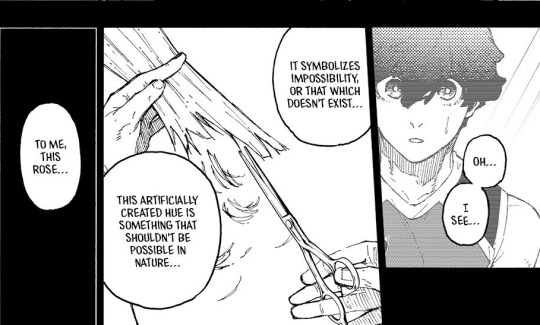
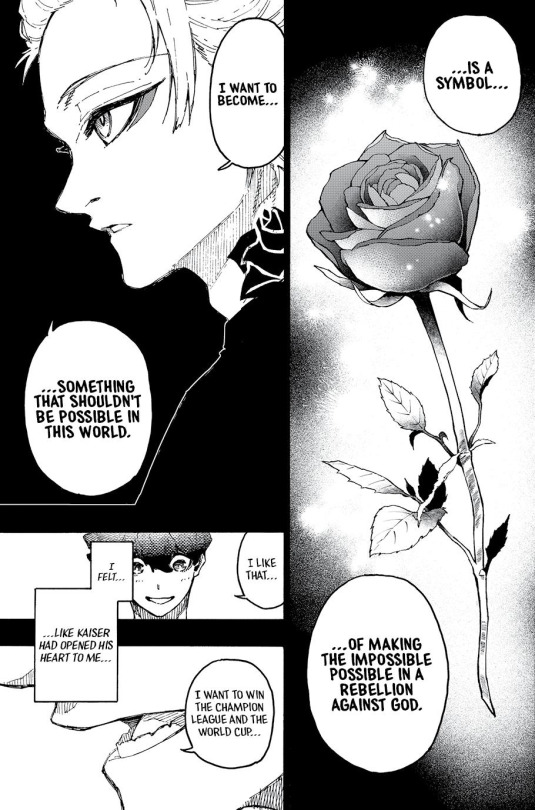
Anyone familiar with the Bible will be aware Kaiser is overtly connected with that mythos: he is named after Michael, a high-ranked archangel. The name itself can be interpreted to mean “who is like God?” (a rhetorical question, since there are none like God according to scripture), or alternatively “gift from God.”
The Biblical angel has many roles and associations, but he is primarily regarded as a warrior, acting as the leader of Heaven's army. Furthermore, Wikipedia references a source which states: "He is viewed as the angelic model for the virtues of the "spiritual warrior", his conflict with evil taken as "the battle within"".
This all tracks in respect of Kaiser's characterisation. He is a strong, tall player with incredible strength, endurance and accuracy. He has a weapon (Kaiser Impact) and appears both omniscient (due to MV) and omnipresent (due to his good playmaking and positioning sense) at the start of the NEL. He's exceptional in every sense. He also has some... issues, psychologically. There's definitely a struggle going on under that ridiculous mullet.
But Kaiser's dialogue in the blue rose panel is interesting. He states that the rose symbolises "making the impossible possible in a rebellion against God". This wording brings to mind another Biblical figure: also an angel, but, er... on the opposite side.


This verbal allusion to Satan tracks with Kaiser's rather villainous aspiration to cause his rivals despair. It fits well, being that the Devil is said to reside in Hell, a place that is almost always depicted as being deep underground.
In conclusion, Kaiser's characterisation is multifaceted. He has the ability to inspire and lead others; he is capable of miracles; he is comparable to a god among U20 league footballers; he is waging a war on behalf of Bastard Munchen against his Japanese teammates; and he desires to send all his rivals to metaphorical hell. God, Angel and Devil, all in one. He's his own strange Trinity.
Without further information about his backstory and the reason for his desire to overcome "God", it's hard to draw conclusions. But he's certainly a fascinating little jerk.
I have some theories on what Kaiser's life looked like before meeting Ness, but that warrants its own post another time.
#blue lock#blue lock manga#blue lock manga spoilers#blue lock spoilers#bllk chp 242#alexis ness#michael kaiser#kainess#mine#blue lock analysis#bllk analysis#boinin talks bllk#long post#tw christianity
83 notes
·
View notes
Text
Visual Motifs: Tesla
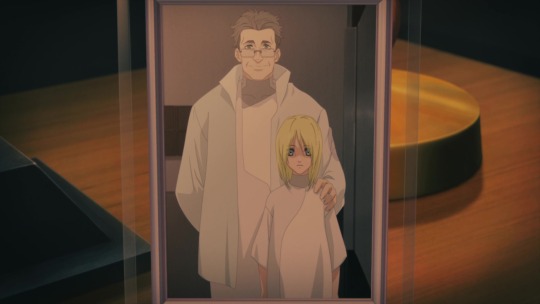
So, one of the benefits of an adaptation like Stampede - a retelling, rather than just lifting from the page - is that they know where it's leading, and they can add context or foreshadowing. For some characters, they can even add presence. In addition, Stampede is required by the limits of the medium to do some streamlining. From all I've heard about their consultations with Nightow, their concern was with themes first.
But there an issue arises in Tesla. What is there to say or do for her? She isn't a presence; she's an absence. There's not much you can add without undermining the gutwrenching horror and thus the thematic impact of her character.
But Orange found a way. In fact, they found multiple ways.
Tesla can never let anyone know what she wanted because she was so thoroughly stripped of action or speech. While she lived no one cared to listen to what she had to say, and she's forever silenced by death. Nightow had to bend the rules to give her a last, ambiguous word.* Memories and assumptions are all that's left. Those are all undoubtedly themes in Trigun. I think it's all still true in Stampede, with an obvious exception.
After all, silence is a statement.
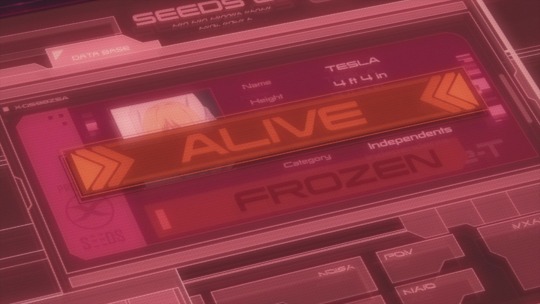
Congratulations to Orange on making it even more horrifying. Though I'm at least reasonably sure that she wasn't conscious in suspension... I hope she wasn't. I suppose it adds to the argument to suggest her fate in the manga was kinder.
It also opens the question of what happened to her in the Fall, but helpfully (?), Nightow had already introduced a means of resolving it. It tidily both suggests a possible future plot point and further characterises Knives in the way he protects what he loves. He says her discovery was to him "but one grain of sand", and he's a fucking liar. (Also, note Dr. Conrad in the picture on Tesla's file. Nai had to learn he was involved somehow.)

My trash boy never disappoints.
Personally I do believe it's jumping the gun to assume Knives actually bears her consciousness, but she had a profound effect on him, much as red geranium petals are now foundational to Vash's identity. While the icon of the Eye of Michael represents a number of things (I'm gonna talk about them too, if I ever get around to it), the variation on it used in the Windmill Village isn't so ambiguous. The arrangement turns up over and over.

Behold the single most obvious way Tesla's made more "present" in Trigun Stampede. (It's sure beholding you.) The motif of Tesla's eye is as central a symbol in Knives as geranium flowers are in Vash. Tesla might not literally be a ghost, but she haunts Knives anyway. He's determined that she'll haunt everyone else too, though they may not know it's her. In his mind, he's her avenging angel.
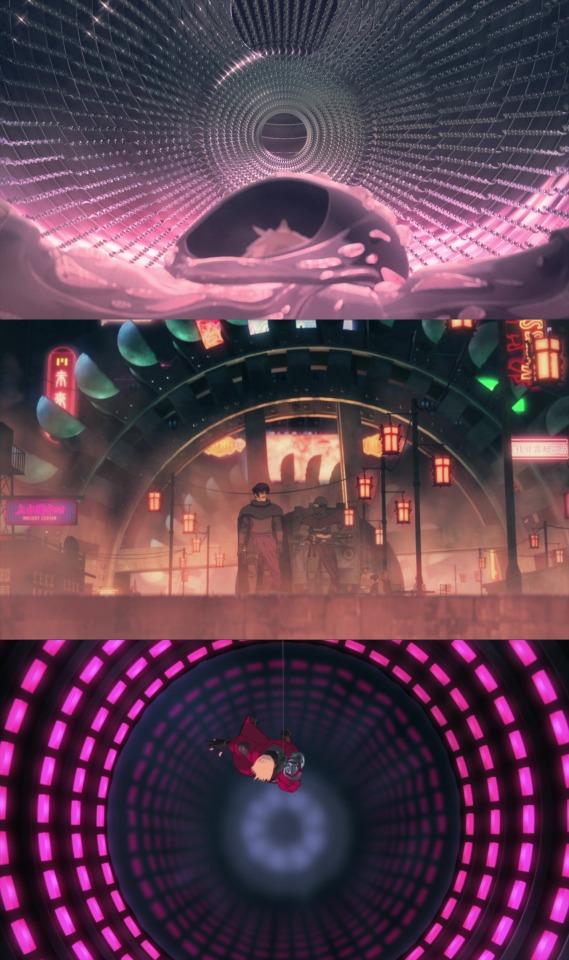
But he isn't the only one who holds onto her.
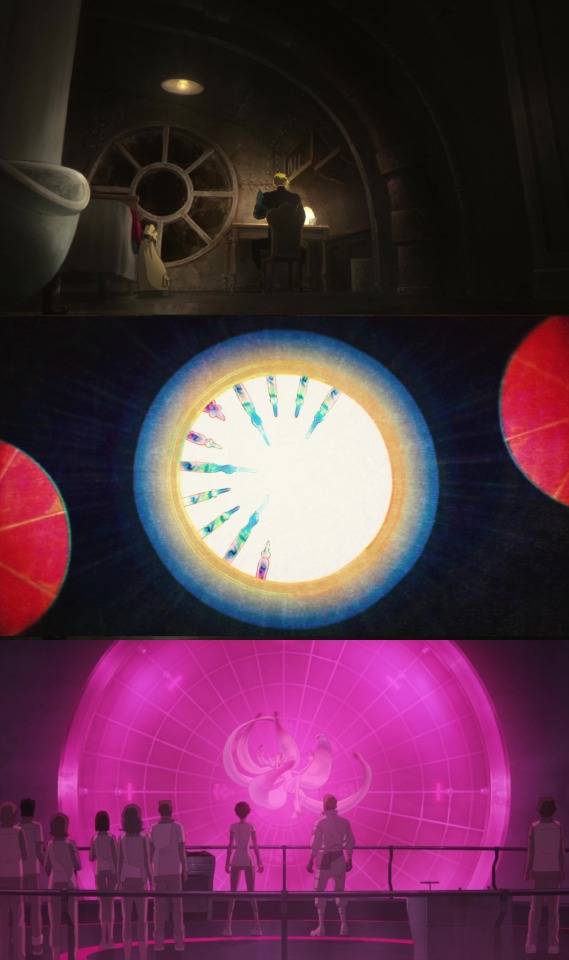
And a certain panel in Maximum...

Though those particular eyes actually represent the eyes of humans. Eyes weren't prominently linked to Tesla in the manga, but this may have been the inspiration.
Speaking of the manga... what about Rem? Though we know it or something like it occurred, in Stampede we don't see the confrontation with Vash where she confessed to her anguish over failing their sister, and how far she was willing to go ensuring he wouldn't be hurt. I understand feeling that it flattens her. The narrative is being dictated by Knives in that moment, who wasn't there to witness it and had a vested interest in removing Rem from the story.
That doesn't mean there's no sign Tesla haunted Rem. If Tesla hadn't suffered what she suffered, maybe Rem would have served an uneventful term as Navigation Officer before going back into cryosleep, while the SEEDS fleet peacefully continued on its journey. It was still because she failed Tesla that Rem adopted and raised the twins. Knives's anger/fear at the perceived betrayal by both Rem and Vash still led to him crashing the fleet, Rem's death, and all that happened in its wake.
It's an interaction we never witness - it may not even have been a direct encounter - and yet Tesla, through Rem, instigated the plot. And that's also still true.
Comparing the discovery scenes in Stampede and the manga directly, there's a change. The flower Rem left as a memorial for Tesla in the manga (looks like a white lily, which represents innocence and purity in the Japanese language of flowers and is often used for funerals) is instead a red geranium.
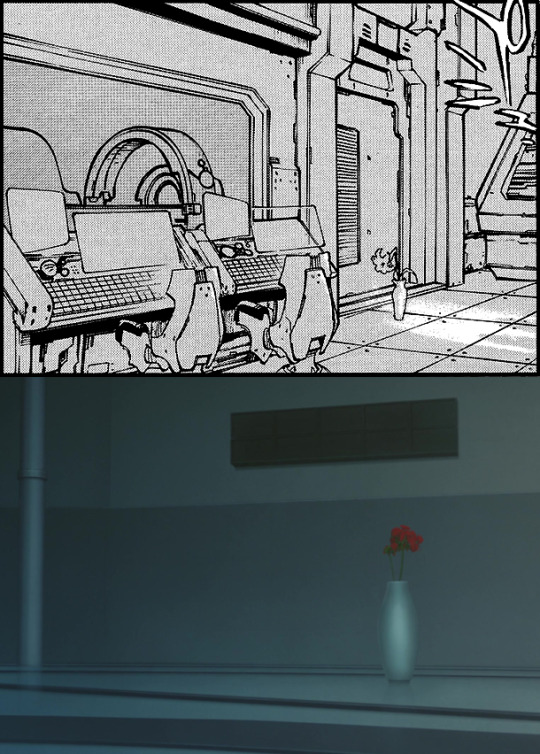
I'd chalk it up to reinforcing Rem's connection with the flower and minimizing the 2D background painting budget, except...
Almost every time the twins as children are together on the screen with Rem, a geranium in a glass dome is there too. The only time it's not present somehow is when they're visiting the Plant room at the start of ep twelve.

And when they find Tesla, there's a shot where this happens:

The red petals are almost invisible in the darkness... and then pop out when she's revealed, like a wound. As if they emerged along with her.
The geranium, to Rem, represents Tesla. When she can, she has it accompanying the twins. The presence of this small, red, glass-bound thing - suspended, mute, so easily stripped of its petals - is perhaps an inadequate gesture, just as Tesla herself never grew to be what she could have been, and adopting the twins may not make a difference. But Tesla can be with her family in spirit and her baby brothers will get a chance to grow. That's all that Rem can do for her now, a regret she bore until the end of her life.
In Stampede, Rem and her successors are positioned as Knives's most direct ideological opposition in a number of ways, and I think one of them is in how they honour the memory of Tesla. Would the twins' older sister have wanted the vengeance Knives wreaked in her name? Or would she have had the grace to hope the humans would learn better? Would she have been happy those who came after her were given the love and the choices that she wasn't?
She can no longer choose. No one will ever know.
And that brings me, finally, to how Tesla haunts Vash.
Unlike the manga, in Stampede it's not as though Vash has any reason to fear being abused, or dismembered, or consumed, or exploited. In the manga he very much feared all those things, and accused Rem of raising them to continue the experiments. He was very angry and frightened to realise he was surrounded by humans and he was "not like them". But in Stampede Vash might as well be a human.
That's definitely a way Stampede thematically diverged from the manga. Nai's the one who's perfect and more like a Plant, because of his powers. Right?

It's Vash who tends to be physically closest to the geranium.
In the SEEDS database, Vash and Tesla are in the same folder, while Nai has his own. There are all sorts of potential reasons, but in my mind it'd be because their colouring matches (yellow-blonde hair, blue eyes). It's Vash (his hands on the left) who notices there's an extra file and starts scrolling through them. He unlocked the database, and he caused the jars of what was left of Tesla to be revealed.
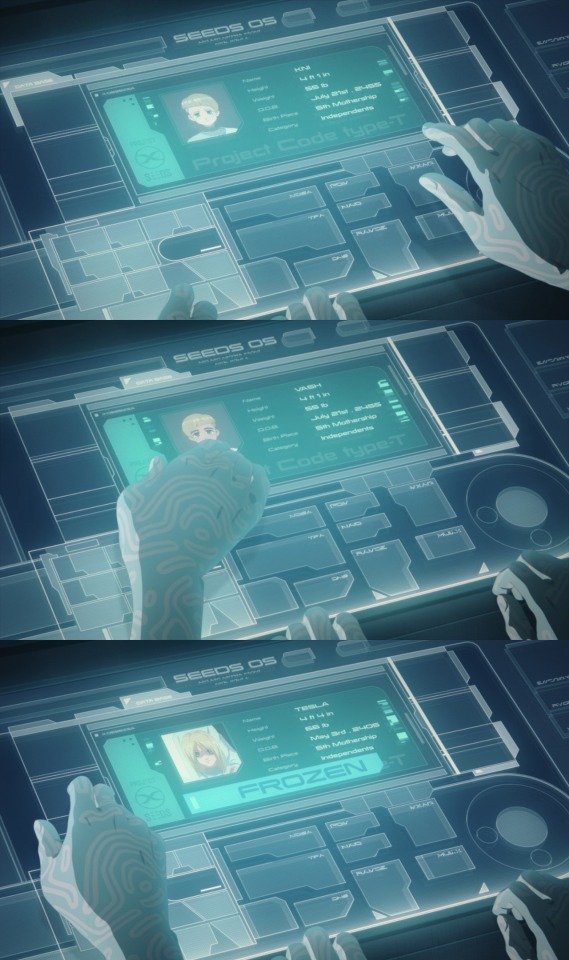
He wears red. Specifically his outfit is red over black - his shirt and pants. And his eyes are the first ones in which Plant patterns are highlighted.
Ever noticed that Tesla's missing both arms?
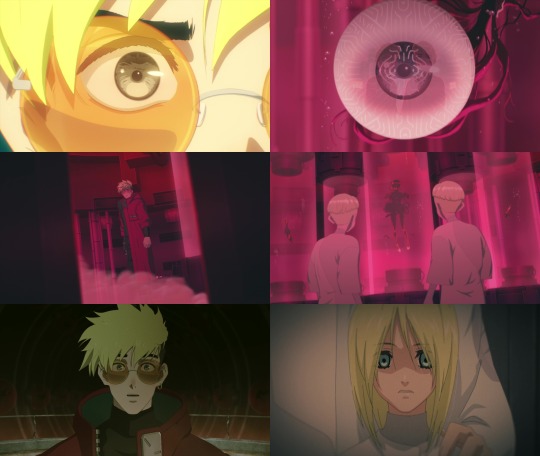
But it's hardly as though Vash is in any position to understand what Tesla felt, or what she wanted.
And it's not as though Knives, in his loneliness and fear and denial of responsibility, would puppet his sibling for the power to take revenge.

Right?
* Don't get me wrong. Nightow's relaxed approach to worldbuilding could have made her reveal in Maximum a plot hole, but it's not. Plants really are weird enough that just about anything seems possible. Nightow created the impression that discovering her remains was so painful for the twins they came to a mutual, unspoken agreement to avoid mentioning it, let alone using her fate as a rhetorical tool. When Knives finally does bring her up, it's just before trying to meld with and then imprisoning his brother aboard the Ark. To me, it feels like his declaration of total war.
#trigun stampede#trigun meta#tw body horror#tw medical abuse#trigun tesla#(but i repeat myself)#no more space left in my soupy brain this one fought me to the last#tl;dr can i just give the poor child a HUG#uh. watch the uh. bits and pieces
31 notes
·
View notes
Text
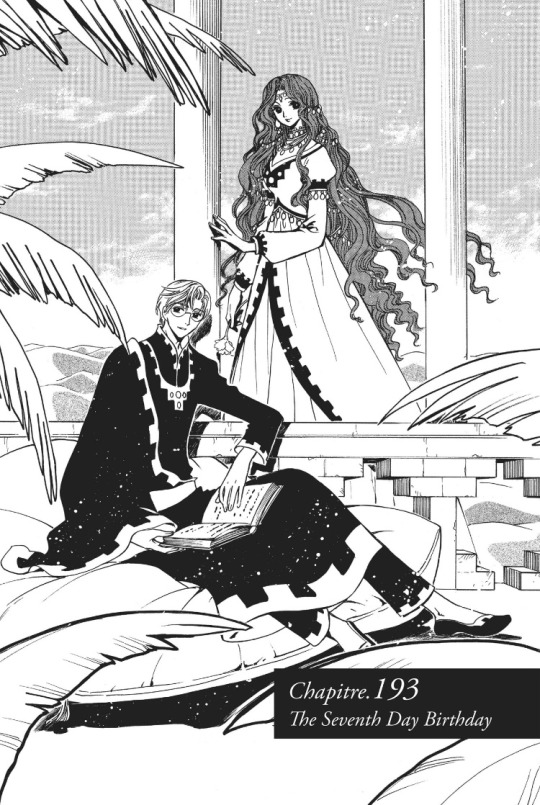
[1]
Chapitre 193 - The Seventh Day Birthday
In which we get lovely couple’s portrait!
I love that this could almost be a royal painting hanging up somewhere. Both Fujitaka and Nadeshiko looking important and astonishing in their own right, but both with the matching friendly gentleness that characterises them both. The splash text really captures their vibe in these chapters:
The more love they gave the more hope would remain
Now all that is left for them to do is believe...
It matches them as well as all the other parallel characters who know bits of what's happening but just have to sit by and watch it all from the sidelines (our starting Touya and Yukito, Yuuko, Tomoyo and co, etc)
It's honestly fantastic that Nadeshiko and Fujitaka are shown here essentially as together and NEAR each other but still physically taking up their own individual space. And the casualness of the moment! The soft touch of fingertips to the pillar in passing, the book still propped open as if caught mid-read, the wind blowing Nadeshiko’s hair out in soft arc. Meanwhile Nadeshiko holds a flower (a Nadeshiko flower??) so casually that you might not even spot it unless you’re looking at Fujitaka - which adds a small note of the something lovely that rests between them.
I ALSO love that Fujitaka is visually out in the open but Nadeshiko is framed on three sides with straight lines - she’s almost completely contained, though her hair escapes out on the right. It could be a neat tie-in to the fact that Nadeshiko’s existence seems to be at stake here - Fujitaka appeared to exist in both versions of the Clow Kingdom, but this is the first time we’ve seen Nadeshiko at all. She could, potentially, vanish from the background of this image and not alter the remaining Fujitaka - as she seems to have done with the [whatever happens to the timeline]. It makes their distance from each other just all that much sadder, especially considering that there’s an actual visible wall between them here. Not a huge one, but one nonetheless! Will they soon be separated due to Evil Wolverine’s shenanigans, or does something else cause their separation?
Oh you could also point to their inverted colour schemes as such a LOVELY way to pair them, so that they’re matching and fit perfectly together but also adding just a hint of being on two different sides of reality.
#All these little separations that build up#In such a gorgeous picture that really COULD just be them together#But Clamp always go next level with it all#Liveblogging the reservoir chronicle#Vol 193#Tsubasa#Fujitaka#Nadeshiko#and the Its Fine agenda#It's fine! don't worry about it!#WHAT COULD POSSIBLY HAPPEN#Just look at the lovely couple don't worry about it!
54 notes
·
View notes
Text
hii so uh. this post (@purgemarchlockdown hi) where i said i would Think About it Visually? yeah i meant it. old men got es quest amane'd

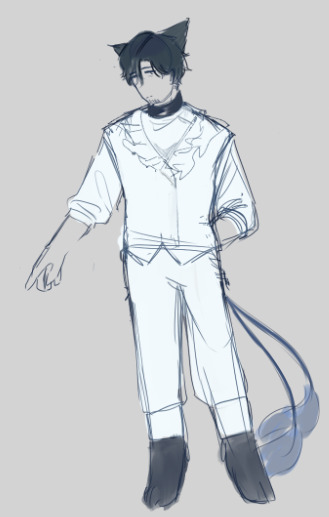
uhh design notes ish + the Thoughts that i wrote down and am now going to Type under cut
ok so. Twas kind of hard trying to put these two specifically into the "damsel" role cuz not only are they both grown men but also they both wouldn't accept the role i think. for one itd be hard to act that way for two. well they both have sperate second reasons ill put it seperated for each character
Shidous was the easy one out of the two to design. Honestly its mostly his prison uniform + a bit of my ocs prison uniform - the straps. His collar gets to be a stethoscope cuz haha. doctor man. Reason A for why itd be hard to slap him into a damsel esque role is that he absolutely Wouldn't Accept needing to be saved. He needs to save, not the other way around. Maybe hes still in the timeloop cuz jackalope thinks its Entertaining watching him try to save the one whos trying to save him. idk. Just to be safe i made it a point to make him as sickly looking as possible (not a tall order i mean look at triage)
Kazui was a fucking bitch to design. My instinct for him was. Yk. Suit. then it was the theatre outfit but....they were both tooo.....detailed, lets say. It didnt fit the vibe. i went with vaugely poet shirt looking following the pattern of his vest in Half and Cat. and before you say the lapel is the wrong way i know . pretend its intentional or mirrored pleas. I also ran into the problem of This Man Does Not Look Like He Needs Saving (as is a very fun aspect of his original MILGRAM characterisation) so i had to. Think. Real hard. all i got was to make the collar more obvious? I was thinking like. those heavy duty collars used for violent dogs mostly. ironic cuz hes a cat. was gonna add spikes but they look tacky in my style oops\
general notes wise. uh. i cant draw animalistic features very sorry. kazuis design gave me an anurysem and uhh. I actually forgot about the cat thing for shidou so all the features are on a different layer. Hope this turned out well i need to go back to studying now o7
#sand speaks#im not maintagging this#its gonna show up in maintag anyway cuz i mentioned milgram lmao#hope u like this nott! i am. they took me so much time to think#i wouldve given shidou a cape for sillouhette reasons but then itd just be his prison unifron#ok byebye. i cant draw animal features be nice to me
33 notes
·
View notes
Text
I know a lot of people have question about the different between the different outherine genders/qualities, so I'm making this post to explain them as much as I can:
Aporinity
[PT: Aporinity]
A quality for genders defined as being separate from male, female, and anything in between, while still being a strong and specific gendered feeling.
It can be both a specific quality or an umbrella term for qualities that are comgender and abinary.
It is not:
Feminine, masculine, epicene, femmuline or androgynous
A lack of gender
Beyond the concept of gender
Aporagender can be:
Comgender neutral (and when it's purely neutral is not outherine)
Relative to neutrality and other non-outherine abinary qualities
relative or comparable to femininity, masculinity, etc
Born of the combination of a brand new quality and a neutrality or of one of those with one of the main qualities.
Some specifically aporine genders are:
aporagender
Aporaique
Aproxora
Maverinity
[PT: Maverinity]
A quality for genders, like maverique (from which is derived) characterised by:
Gender autonomy
A strong sense of gender
The lack of any kind of connection to pre-existent qualities
It's not:
Xenine
Beyond the concept of gender
The lack of gender
A combination of genders
Derived from pre-existent midbinary or abinary concepts
Some maverine genders are:
Maverique
Gendermaverick
Maveresque
Mavraen
Proxveri
Autonominity or gender autonomy
[PT: Autonominity or gender autonomy]
This quality refers to genders characterised by:
Independent.
Self-determination.
Being defined by oneself, without the imposition of outside structures and authorities.
The re-definition of pre-existent qualities, gender and roles through a personal, individual lens.
In this last point lies the difference between this quality and maverinity; while maverinity is only itherine, autonominity/gender autonomy can be umbine or preterine too.
This can also be used as an umbrella term for all the qualities charaterised by autonomy, including maverine genders.
Some autonomine genders are:
Autonomique
Egogenders (autonine)
Maverine genders
Alithix (As it's defined by personal authenticity)
Ilyaginity
[PT: ilyaginity]
It refers to genders, like ilyagender (from which is based) with:
A tangible presence of gender
Fully disconnected from pre-existent qualities/concepts
Some ilyagine genders are:
Ilyagender
Proxilya
Ilyaen
Autoninity
[PT: Autoninity]
It referse to qualities an genders characterised by being exclusive of an individual person (or system)-
These genders are collectively called egogenders and are characterised by:
Complete autonomy from pre-existent concepts
Individuality and personal autheticity
Relation to one's personhood or systemhood.
Self-determination
Perainity
[PT: perainity]
A quality for genders characterised by:
A complete disconnection to the fem/masc/neu trinary
The presence of gender
The lack of confusion or apathy regarding one's gender.
It's not:
Feminine, masculine, neutral or any combination between them.
Agender or quoigender.
Some peraine genders are:
Péra or Peragender
Peraique
Proxpera
Atraeninity
[Pt: Atraeninity]
This quality exist in relation to both masculinity and femininity, but rather than existing in between or as a combination of them, as it's the case of androgyny, epicenity, effemininity or femmulinity; it exists in opposition and confrontation to/with them, as if forming a triangle.
Here a quick graphic I made visually explaining the relation between femininity, masculinity, androgyny, epicenity and altraeninity:
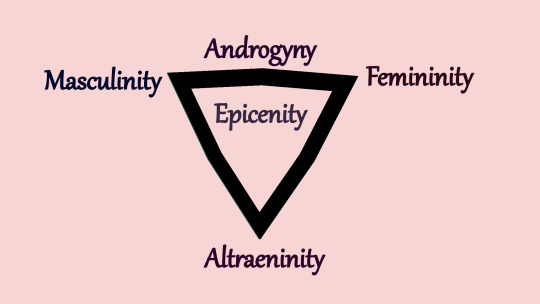
Altraeninity is characterised by:
Being midbinary.
Being described by a sense of "pure androgyny
A feeling that your gender "matches" femininity and masculinity or male and female, while not being derived in any way from them
A sense of gender
There are also qualities, like Ambiguity/ambiguinity, pandrogyny, ainulinity, aineminity, etc that can be considered ouherine or not. I'll put them in a different post.
Part two
44 notes
·
View notes
Text

Happy, happy Friday!
We're delighted to usher in your weekend with part two of the Friends of Farm Witches Faves!
The coven loves these lists and hope you do, too. Go read and leaves those comments and kudos!
===================
Always Then & Now (@my-nameless-bliss) “So much to love here - the pacing, the character, the growth, the love! These vulnerable discussions about marriage. Just perfect.”
Beloved (@blackandwhiteandrose) “David as a funeral director is somehow perfect. An incredible and unique AU.”
Bloom (@smallumbrella369) “Specifically? Everything.”
Cloudy with a chance (agoodpersonrose) “Rival weathermen! Very snippy, and very sweet.”
Getting over getting older all the time (@distractivate) “I love the writing and characterization of our beloved characters over 10 years. The writer made me love someone who Patrick is not meant to be with. I can’t recommend this one enough.”
Going down (@concannonfodder “One of the first long AUs I read in this fandom. It's beautifully written and sexy as hell. I love how the author writes Patrick teetering on the brink of discovery, the tenderness, the sexytimes, as well as the passion with which they place us right there in New York, among David's favourite foods and sights. Highly, highly recommend.”
Measure for measure (@schittyfic) “I love that this writer has managed to make dick measuring both so sweet and so hot. The perfect read.”
Molten glass hearts (januarium) “Glassblowing, Patrick, and David have never been this hot. Sounds like nonsense? It totally works and they're better off because of it!”
The necessity of risk (returntosaturn) “Original. Sexy. Romantic. Hands-down, the best tattoo fic out there.”
One Night in Milwaukee (@flowerfan2) “Everything! There's something for every mood- humor, angst, growth, communication, sexy times, food. It's very visually descriptive, and such a fantastic rom-com twist at the beginning! There's also a couple of follow up fics in the series, because one was never enough! I've reread this so many times!”
One Star at a Time: A Survival Guide for the Reluctant Camper (@cinnaluminum) “Everything. Characterisation, pace, setting, story. It's thought-provoking, almost profound in parts. It's emotional and intense and quotable and perfect.”
Waiting on the day (high-seas-swan/@noahreids) “Slow-burn amazingness.”
You should let me save the day (@simplymarleycat) “While this fic has so many favorite tropes in it, it doesn't feel rushed or like they were jammed haphazardly into it. David and Patrick's budding relationship from complete strangers into much more over the course of one night just pulls you with the perfect balance of canon-adjacent content. If you need a comforting, sweet, and hot fic, look no further!!!”
#friends of farm witches fic recs#sc fanfic#sc fic rec#schitt's creek fanfic#schitts creek fic#schitt's creek fic#sc fic#david rose#patrick brewer#david x patrick
32 notes
·
View notes
Text
I do have two upcoming exams in two and three days respectively so naturally i spend all my time thinking about Radskier (as you do). Those circumstances let me to a thought which will not leave my mind, and i'd love to here more opinions on it. (sorry, long post incoming)
Before i start, a little disclaimer: I haven't read the books nor played the game, so what im about to say is only and purely based on and referring to the show.
So, I'm not sure how everyone else feels about Radovid, but it actually took me some time for him to grow on me. And this is partially because i had envisioned him differently, especially after seeing Hugh Skinner being cast.
So my first thought seeing him on screen was literally "what's this wet cat looking man?"


Those didn’t quite fit, but i couldn't put a finger on what's my actual association was. So I ignored it. The man and the ship grew on me, and so I've spent quite some time watching fan-edits of Radskier on YT these past days (side note: i need MORE, there aren't enough out there!)
One of those videos feature The Calling from TAD's lates album ruin and when Madeleine sang about that fox, it hit me. THAT was my initial association!!!
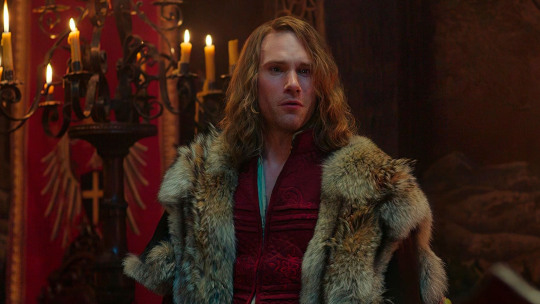

I mean, just LOOK at him, he's so fox-coded?! the hair(-colour), his red coat, the FURR!!! And thats only the visual resemblance. I can't help but also notice parallels in his characterisation and with what personality traits foxes are usually associated.


all of those traits we have also already seen in - or can assume for - Radovid.
He's intelligent (and tries to hide it), as Jaskier so perfectly points out for us. He's sly, and deceptive. Cunning, and determined - and charming. We might also assume that he has at least some cruel tendencies from the way he's portrayed in the games...
But now, whats REALLY interesting is looking from this perspective at the Geralt/Radovid comparison, which Jaskier so cleverly opened with his hammer-spoon-metaphor.
Because more than Radovid, Geralt even is canonly referred to as "White Wolf" (which a friend of mine so cleverly pointed out might have been Jaskiers invention!)
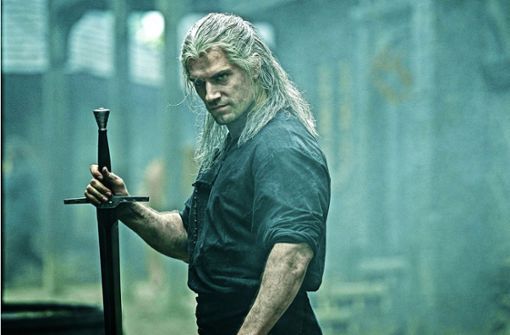

This is not only because he is from the school of wolf witchers and has white-ish hair. He's tall, muscular, grumpy looking, fast, a hunter and so on.
But he's also characterised that way!
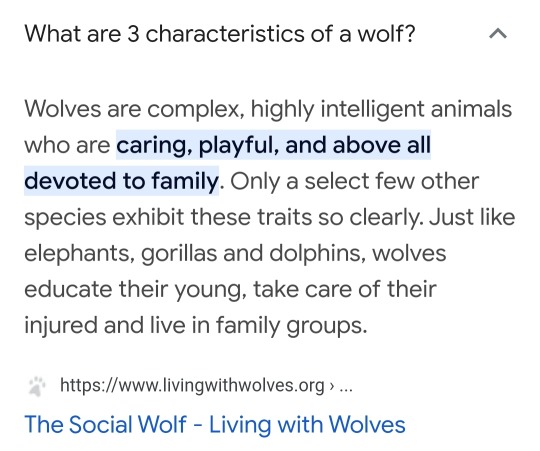

He might be the lone wolf, but he cares for nothing more than his pack and will protect them at all cost.
Both animals are canines, but theyre characterised as differently as possible. Both are predators but but their way of hunting couldn't be more different.
Now, coming back to the witcher and those two characters, it's easy to assume this character design of Radovid wasn't a coincidence.
In a way they're parallels when it comes to Jaskier, both fighting for his heart loyalty.
Geralt is a hammer, a wolf, secure in his ways, stubborn, but not always right.
Radovid is a spoon, a knife, a fox, with tricks up his sleeve and a mind like a maze.
#this isn't me trying to bash Radovid btw#he's an amazing character and i cannot wait to discover more of his depths#AND him and Jaskier are so an interesting ship?!?!#the tension#the looming doom!!#delicious!#this is merely a observation i made that i found quite interesting#and wanted to share#radovid#radskier#geralt of rivia#geraskier#jaskier#the witcher#the witcher s03
76 notes
·
View notes
Note
what the FUCK do you mean you wrote two of the best prototype fics AND drew some of the best art. illegal
seriously though i am in love with your characterisation, especially of all three mercer siblings. frankly your version of dr mercer is the best ive seen in the entire fandom lmao
Thank you! I'm really glad you're enjoying that terrible bastard of a man. Dr. Mercer enjoyers unite. We love this evil skinny twink
Thoughts about Mercer sibling characterization + themes of the game (under a cut because it's VERY LONG):
The thing I try to stress when writing Doc Mercer (hereto referred to as "Xander") is that yes, he is a narcissistic, vain, arrogant bastard of a man, generally irredeemable, with extremely loose and/or nonexistent morals and a terrible personality.
However, [PROTOTYPE] is a game where most of the characters are some level of fucking awful and monstrous, but their motivations are still explored, and sometimes even still justified. I mean, Alex eats people. Randall was on his way to nuke Manhattan. Blackwatch regularly laughs at being able to murder innocent civilians. A powerful moment in some of the WOI's is Blackwatch gleefully discussing killing people, while the visuals show a camp on a rooftop where the survivors have written a big "NOT INFECTED" in a bid to not be murdered by Blackwatch.
Still, there's nuance there. Alex may grow a conscience and save New York, but he's still, you know, a walking viral apocalypse that both eats people and enjoys it/thinks it feels "right." Blackwatch murders all the people they want, but at the end of the day, they ARE the line that stands between humanity and viral apocalypse. And Randall might even be justified in nuking Manhattan if it means taking Alex out, because - you know - walking viral apocalypse (and for all Randall knows, ZEUS only killed Elizabeth to establish his dominance as hive queen supreme). I don't see why Doc Mercer should be exempt from that nuance, but he so very often is.
So that as my starting point, what do we know about Doc Mercer? Well, mostly from the PRIMA guide, we have his backstory. This backstory is so hilariously awful that I legitimately don't think I'd believe you if you told me he wasn't supposed to be sympathetic.
Xander's mom is thrown in jail right after he's born, no other family is willing/able to take him in, so he's thrust into the foster care system (no father is EVER mentioned, ever)
To make matters worse, Dana's bio mentions that she moved "to New York" to follow her brother, implying that they aren't NY-born, which further implies that they're from NEW FUCKING JERSEY LOL (it's only like, an hour's bus away from Columbia U, where Xander went to college)
Xander is kicked around foster care system like a hot potato until mom is released from jail. Seems like she either got pregnant right at the end of her stint, or right as she got out; he's 10 when she regains custody of him, but 9 when Dana is born.
Dana's bio says "[Xander] was the only parent figure Dana ever knew." It also said their mother had "drinking problems." Xander raised Dana to the degree that she literally doesn't even see her mom as a parent.
"For [Xander], foster care was better." Yikes. That's definitely an implication of abuse (if the parentification weren't enough). What kind of abuse? Well, they're often bundled together, but we can make a Strong Case for extreme violence at minimum, given the following:
What was mom in jail for? A 9-year sentence implies a second-degree crime, which, uh... take your pick: aggravated assault, aggravated arson, theft of an item more than 75k$, armed burglary or burglary that results in injury or threats of injury, unlawful possession of a firearm, sexual assault. Yikes
Bio outright describes it as living in "abject poverty," so with the fact that he was LITERALLY the only parent Dana knew (a role he was forced into starting at the age of TEN), as soon as he was legally able, he probably had to take on a job in addition to school and childrearing.
Given the "abject poverty" angle, I find it doubtful that he was able to leave home until he graduated, especially given that a commute from Jersey to Columbia U could be as short as an hour. Since he graduated from his PhD at the age of 24, that means he was Dana's parent until she was fifteen. 3/4 of her life by the time of the game.
Needs to be stressed: this man changed her diapers, warmed up her formula, cooked meals for her, helped her with homework, taught her sex-ed and what puberty was, helped her get her first job, taught her how to apply for college. He is, for all intents and purposes, Dana's father. (Put a pin in that!)
Like... holy shit! This is a sympathetic character! I don't know how anyone would be able to read that in isolation and not feel bad for this guy. I mean, this is a person who has literally ALL the trauma. Like, he's in the 99th percentile of worst childhoods in America. This boy has collected PTSDs like they are pokemon.
The PRIMA guide literally says that, at the end of all that, he "trusted no one, had no friends, cared less and less what others thought of him," and was an "impatient, dark, tortured person" with a history of burning bridges. "Forever paranoid," "morally ambiguous," and "teetering on the border of sociopathy" are also used to describe him, and - yeah, of course! I mean, did you SEE his backstory? Holy shit.
And what really fascinates me about this is that, even under those circumstances? He was probably the best parent he could have been to Dana. She literally sees him as one, stuck around NYC for five years because he was just that important to her, and trusts and cares for him so deeply that she's willing to risk her life for him/willing to forgive Alex ranting about how eating people "feels right."
Some people argue that he was using Dana as a pawn, or manipulating her, etc. etc., and I really dislike this take (though, of course, everyone's entitled to their own HCs etc., especially because a lot of the PRIMA stuff was clearly rewritten by the time of the game's release). First, I think that a working college girl with a fiery personality like Dana would not have stuck around for FIVE YEARS if she didn't feel like Xander deserved it - and given that he was also ghosting her for those five years, any manipulation he had her under would have worn off. Like, it's REALLY HARD to gatekeep gaslight girlboss someone if you're no-contact with them. Also, are you trying to tell me that an eleven-year-old boy was looking at a literal 2 year old going "yes... I will raise her to trust me absolutely... as a tool for me to use in the future... and then completely ignore her calls for 5 years!" C'mon.
But the second, and more important, reason I don't agree with that take is that I feel like it strips Dana of agency and reduces her to this almost damsel-like role. Nah, man, even if Xander was not her brother/dad, she would have risked her life to help him out. Why? Because she's a fucking anarcho-socialist journalism student, that's why!
Her PRIMA bio is really interesting in that regard; I feel like the game didn't show off well enough just how awesome Dana actually is. She's studying journalism at NYU. You may have heard that her job is "writing tabloids," but that's such a simplification/misunderstanding of the text! We actually have the titles of the publications she writes for, and they are: "Everything You Know Is Wrong", "Bathsheba", and "The Military/Industrial Complex Report." Even just from that small glimpse (and the fact that she calls Blackwatch "goose-stepping motherfuckers"), I think it's evident that she's got some deeply anti-government, anti-military, anti-fascist beliefs.
Furthermore, Dana is like... kind of a terrible person. Here's a great excerpt from her bio that I feel like isn't talked about enough (emphasis mine):
"She owes money all over town, and somehow manages to sweet talk friends into lending her more. She's a hustler, good at manipulating people. Like her brother, she's narcissistic and evasive. When she doesn't like someone she'll go out of her way to make sure they know it - particularly if they push the point. She's disrespectful, foul-mouthed, and not afraid of a fight. This all serves her well when she's neck-deep in a story, but in real life, her kind of behavior only makes her one thing: enemies. In short, she's her brother's sister."
Guys, I am not normal about that last sentence. It's phrased the same way as "she's her mother's daughter" or "she's her father's son." Like. Oh my god, Xander is basically her dad.
But back on topic: Dana is characterized as a BADASS BITCH who doesn't take shit from ANYBODY and is ALREADY anti-government. She literally calls the Blackwatch shit "the story of the century." She would have taken that case on even if it weren't her brother presenting it to her, no manipulation necessary.
AND she knew the risks. I've seen it argued that Xander's to blame for "tricking" her into investigating something that put her life in danger, but I think that's unfair to him. First, I think Blackwatch would've investigated and/or disappeared Dana either way, given how trigger-happy they are. Second, she knew the risks - that's why she was using her friend's penthouse apartment as a safehouse. She was prepared to risk her life for this story; BW just moved faster than she anticipated and ambushed her at her apartment.
(And, also, like, just as an aside, we don't know if she had permission to be in her friend's place, and given her PRIMA bio, she probably didn't, like she just full-on broke into her friend's really nice apartment LOL probably even chose the friend with the nicest digs LOL)
This also serves as such an interesting glimpse into not only her and her brother's relationship, but her brother's characterization. We already know that Xander possesses good social skills to some degree, given that he has a girlfriend who was willing to risk her life for him (she went back to the lab to get something for him, which is how she got caught - let's ignore for now the ethics of dating his subordinate); he also climbed the ranks at his job, rising to Associate Director (McMullen's direct subordinate) sometime within only five years.
Dana's bio, however, confirms it. Every description of her personality becomes associated with Xander with the phrase "she's her brother's sister." Xander is a hustler; he's manipulative and gets people to do what he wants. Xander is evasive, disrespectful, and lets people feel it when he doesn't like them. Xander makes enemies. BUT.
Even in the midst of all that - his paranoia, the fact that he's having a freak-out because his coworkers are being "silenced," and that he ghosted Dana for five years in an effort to leave the past behind him... who does he trust to have his back? Dana. I need you guys to understand. He doesn't go to Dana because she's an easy tool for him to manipulate. He goes to Dana because he's scared for his life and she is the only person he trusts. I think there's a reason Alex latches onto her when he learns she exists, and part of it is definitely because the scaffold he's built on, the original Dr. Mercer, viewed Dana as unconditionally trustworthy. The feeling is mutual.
And just in case you needed some sort of in-game proof? He has at LEAST two photos of Dana on his foyer wall. Legit. Go back and rewatch that cutscene when Alex walks into Xander's apartment. He has 2-3 photos of Karen... and 2-3 photos of Dana. He's been ghosting Dana, but he keeps photos of her on his wall, where he sees them every day, right next to where he works. One of the Dana photos is also the only photo that Xander is not in. I just... he loves his sister. He's just too mentally ill to be normal about it and keep in contact.
So, we have here pretty much Xander's ONLY redeeming quality: cares about his sister! That's it. That's all he's got. Let's talk about some other irredeemable stuff.
So far, I've talked a lot about the PRIMA guide, but now I'm going to talk about what's in the actual game, because it's quite interesting, and I don't think all of it made it into the fandom zeitgeist. It's too bad, because this one major fact really adds a shitton of nuance to this character:
Xander was out of the loop.
Xander did not know anything about Hope, Idaho. Xander did not know that Blackwatch existed. Xander didn't even fucking know that his human test subjects were deliberately infected. Within day one, Alex knows more about the conspiracy surrounding Blacklight than Xander ever did. And we know exactly how much he knew about the virus because he mailed Dana a laptop containing everything he was able to find, and it pretty much got as far as "MOTHER is named Elizabeth Greene" and "Hope, Idaho existed...?" We have a WOI where Randall expresses concern over even giving Xander access to MOTHER, and a WOI where Xander is pissed the hell off when he finds out that their human subjects were not naturally infected. He didn't know!
That suddenly casts his role in Blacklight's production in a much less nefarious light. Look at this job from Xander's point of view: You're a 24 year old who completed an 8-year college run (undergrad and PhD) in six years, WHILE raising a teenage girl and probably while working, too. At graduation, you get offered this insanely cushy job, with a threat that you'll be blacklisted from the industry if you refuse (this literally happened to Dr. Ragland, according to his PRIMA bio). It's a top-secret government job. The government's not great, but you have loose morals, and it can't possibly be worse than Albert Einstein building the atom bomb. So. Whatever.
(On top of that, they're already lying to you abour what the project's purpose is. Xander states he "didn't know" what he was working on until he "figured it out," and there's a WOI where one employee raves that the virus could be used to cure every disease on earth. It seems there was a general vibe that they were probably working bio-weapons, but no one knew FOR SURE, and a contributor to Xander's meltdown is the fact that his research results just... vanish. He doesn't know what they're being used for.)
Plus, holy shit, the pay. Xander is making, like, seven figures by the time he's 29. He lives in an apartment on the Upper East Side (where Gossip Girl takes place lol). The average price for a one-bedroom there is, like, 4000$ a month. This man spent 24 years in brutal poverty; the money matters to him.
On top of that, the stuff they're doing at GENTEK? Of course, it's stomach-turning, but it wouldn't clock as inherently unethical. Xander's fury at learning that MOTHER was a test subject, and not naturally infected (as he's been led to believe), implies that they were NOT infecting people at GENTEK. The bodies we see in WOI, their test subjects, were already infected by the time they got there, supplied to GENTEK with a cover story, that the virus was one they'd found naturally, and that these people - whose brains were fried by the virus - were just unlucky victims of random happenstance. Furthermore, making viruses more dangerous is legitimate virology. It's called "gain-of-function" experimentation, and while it is controversial (for obvious reasons), it's still something you would potentially be doing at an above-board lab.
That means that, prior to Penn Station, the worst Xander can be accused of is being a bootlicker, class traitor, who knowingly worked on WMDs for the US government. And yeah, that is monstrously evil, and Albert Einstein is a monster by that metric, but it's a level of evil that's matched or surpassed by almost every other character in the game. Dana and Ragland are the two exceptions, maybe Karen too, depending on whether you think her low hierarchical position absolves her of any sin. McMullen and everyone at Blackwatch are all more culpable than Xander. They're the ones giving him orders - he's the low man on the totem pole!
And his reaction upon realizing how deep the rabbit hole goes? It's not asking to join up with the evil side. It's not going out to do a terrorism (even if that's how it ends up). It's blowing the whistle. His first instinct is to go to his sister, the anti-government, anti-military journalism student. And as he spirals into panic and anxiety, it's to escape the city, while warning someone - probably Dana - to "get out of there". Even McMullen says, when Alex confronts him, "you were always so smart. You were ready to give up all our secrets. [...] We were trying to figure it out -- you just wanted to bring it all down." The class traitor was about to redeem himself. His motivations might still be selfish - to punish the people who lied to him, to save his own ass - but he's not a cartoon villain.
It's only after he's cornered, staring down guns, realizing that all his efforts were futile, possibly even realizing that Dana is next, that he smashes the vial. AND EVEN THEN... I think we're supposed to understand why he did it. Not sympathize, necessarily, but... look at his life. Abandonment, abuse, parentification. Skipping meals to make sure Dana can eat. Running on a sleep deficit because homework has to be done after helping Dana with hers after coming home from work after going to school. His wealth and girlfriend are hollow victories when he can't trust people enough to make friends. He loves his sister, enough to keep her photos on his foyer wall, but can't bear engaging with her as an adult on equal footing. He thought he'd finally caught a break, only for it to turn out to be a death trap from the start. Yes, choosing to smash the vial was an irredeemable action, a selfish, vindictive, and evil choice; however, I don't think he could have chosen differently. Dr. Mercer was not necessarily intended to be a sympathetic character (although he was), but he was certainly, bare-minimum, intended to be a tragic one.
It seems like the game went through several rewrites, and those rewrites confuse a pretty major plot beat: does the virus Xander releases at Penn Station burn itself out, or does it go on to become the main virus on the streets of Manhattan? This question, and where you personally fall on it, is really important. And that's because... if the virus burns itself out in Penn Station (which apparently the writer confirmed on Twitter, but there's evidence in the game to suggest the opposite), then that means Xander has one of the lowest body counts in the game.
Yeah, you heard me. Let's say the virus burns itself out in Penn Station. How many people would that even be? A few thousand? In 2009, Penn Station served about 300,000 people per day. That is really busy, but obviously, not all of those people - or even a majority of those people - are going to be in the station at any given time. It's probably a number around four digits. Um, how many people does Alex kill over the course of the game, again? Obviously, the in-game kill counts can't exactly be trusted, because you can rack up millions depending on how much you fuck around, but it's generally agreed that he's in the tens of thousands, between all the military bases he destroys, civilians he eats, and soldiers he cuts through. Randall has been confirmed to have ordered the glassing of both Hope, Idaho, AND Two Bluff, Arizona, with an attempt on Manhattan. (Cross also mentions a Kentucky in one of the cut lines, implying there's more cities and casualties than we even know about.) There are 1.6 million people living in Manhattan in 2009, so Randall was about to kill, like, a thousand times more people than Xander.
It also means he never put Dana in danger. If it's a virus that burns out on its own, he - the person whose work was "years ahead of his nearest competitor" - would know that it wouldn't reach her. And it would make sense if it burns out, too, because it's a bio-weapon. Not a great bio-weapon if it causes a a whole-ass apocalypse! And I also don't think it's fair to blame Xander for Alex letting Elizabeth Greene out of her cage, because by that point, 1) Xander is dead, 2) Dana sent Alex there, 3) Alex is a fully sapient and independent being who is not under Xander's orders because Xander is dead. I mention this because I've literally run into people who believe that the virus burned itself out at Penn Station, BUT ALSO that Xander releasing the vial directly put Dana in danger of infection AND that Elly's rampage is somehow his fault. You can't have it both ways!
That's actually why I don't believe that the virus burned itself out. Narratively and thematically, it's much better if Xander did release his virus knowing that it might cause a full-on apocalypse. That does make it so that he risked his sister's life (although you can argue that he figured she was as good as dead, anyways, given that they'd tracked him down - I don't, since I think he was too busy panicking and being sleep-deprived to be thinking about that), and it DOES make the entire ensuing tragedy his fault. And the reason that this is important is because of Xander's role as a "father" to Alex.
Here's something else that's important to note, which I often see overlooked: Alex places the blame on the shoulders of Randall, not Xander. "You bastard," he says after he's eaten Randall. "You could have stopped all this - you let it happen." Meanwhile, here's what he actually says about Xander: "what Mercer did is beyond forgiveness," and at the end of the game, "Alex Mercer. This city suffered for his mistakes, for what he did at Penn Station. And whoever he was - that's a part of me." We aren't supposed to think he's unilaterally evil without nuance. Pretty much everyone, Alex included, has done things "beyond forgiveness" in this game. We're instead supposed to ponder what it means to be derived from his stock.
What is Alex's characterization? To be frank, Alex is a dumbass baby. I know that this is not necessarily popular, but I genuinely believe that it's intentional. There are literally cut lines from the very first mission that REALLY drive home that this poor guy has NO IDEA what's going on. Begging people to stop shooting at him, thinking to himself "where's a place with a lot of people?" (honey, you're in NYC), and generally going "what was that? how did this happen? what's going on? what? huh? what?"
There's also needing Ragland to suggest to him the novel idea of breaking both spines on the leader hunters, and following Phone Voice into a death trap, and then still listening to Phone Voice a second time, not to mention how awkwardly he shrugs his way out of Karen Parker's hug, or how he's constantly pushing himself all the way into Dana's personal space/startling her/disappearing while no one's watching. There's a point where his brilliant plan for getting McMullen to land is to disable some infection detectors... while standing ankle-deep in biomass... looking up at McMullen. He's just, ah, ehm... not the sharpest tool in the shed. If you replay the game with that in mind, it... yeah. I mean. His first instinct upon being attacked by helicopters is to go up onto the roof of a building, where he is surprised by... more helicopters. Who left this child unattended? Where are your guardians.
I know I'm exaggerating - Alex does show remarkable flexibility and adaptability and on-the-fly problem-solving sometimes - but when the PRIMA bios and McMullen repeatedly stress that Xander is clever, manipulative, a schemer, a hustler, "so smart," it really highlights how... straightforward Alex is in comparison. You cannot tell me that Alex, as he's presented in-game, is "a lateral thinker - plans within plans."
And the interesting thing is, this actually seems like a fairly late-stage change! The original PRIMA guide blurb for "The Prototype" seems to suggest that he is actually an amnesiatic Dr. Mercer, not a wholly separate entity. It goes on and on about how "The Prototype" is cool, calm, dry and witty, always in control of his body, etc. etc., but that really doesn't match the in-game characterization at all (he's consistently characterized as awkward, unsure of himself), meaning that I think this is more proof that a characterization as "fucking idiot dumbass baby" was intentional.
Sampling of cut voice lines:
"Ghost Twelve, Ghost Twelve... oh, shit, that's my callsign..."
"Aw, I hate D-Codes..."
"They think I'm dead. Perfect. I can't wait to see the look on McMullen's face."
"I need to get somewhere with a lot of people... somewhere where they can't just keep firing at me."
"Where is there a lot of fucking people? Where?" (girliepop you live in NEW YORK)
"Just remember! This was your idea!"
like. cmon, man.
That being said, Alex is not innocent. He starts the game without a conscience, easily and effortlessly killing people, instinctively eating them, too. He's quite literally built upon two existing minds - the people-eating virus, and the sociopathic misanthrope. I think this is why he defaults to shoving people and has no option to put them down gently - he's filled with Xander's rage, his hatred, and his casual cruelty. One of his earliest lines is this: "revenge was the only clear thought in my head. The only one I could call mine." LITTLE DOES HE KNOW. He continues. "I wanted to find out what happened to me. The reason. Someone to blame. Someone I could punish."
And now we get into a major theme of the game, my thesis: [PROTOTYPE] is about family. It's about nature vs. nurture, it's about the cycle of abuse, and it's about how the people who raise us, shape us. Xander is the "father" of this story; he's consistently placed in that role relative to Dana, and Alex directly inherits his genetics, his appearance, his name, and even his initial personality from him. And as for the mother... there is literally a character in the game named MOTHER.
Alex is, in a very literal way, the child of Xander and Elizabeth Green. He was born out of a fusion of their DNA - the virus infecting Xander's body. Elizabeth also literally says "I am your MOTHER" in their first meeting. And as if that weren't enough, Elizabeth's relationship to Alex directly mirrors Xander's relationship with his own mother: the first thing Elizabeth does is abandon Alex, and when she returns, it's only to threaten Dana's safety and torment him. Xander himself becomes a mirror to his own absent father, disappearing before he ever got to know his son. This is the cycle of abuse, the tragedy that occurs when someone who was abused becomes trapped by it, and has no ability to operate outside its confines, perpetuating the pain that was inflicted upon them.
However... something's different. Alex is not left alone to suffer like Xander does. He has Dana - a parental figure who loves him unconditionally, whom he loves unconditionally in turn. And she is the impetus for his ability to change, the one who most directly molds his burgeoning consciousness. His interactions with Dana are brief, but even in those brief interaction, she teaches him empathy ("my god, [Elizabeth]'s just a girl. What kind of fucking monsters are these people?"), kindness/mercy ("whoa, whoa, whoa. [Ragland]'s a good guy"), and trust ("look, no matter what, you're still my brother"). Let's go back to our pin. Xander is Dana's "father" also... and he was the best one she could have had, given the circumstances. Dana represents breaking the cycle. Dana represents Xander's single redeeming quality.
In other words... the key difference between Alex and Xander is that Alex has an adult figure in Dana that he can trust and rely upon, something Xander never had... because Xander was that for Dana. Xander broke the cycle. That's the one good thing he managed to do.
Now, we know that lots of rewrites happened, that final boss stuff got shifted around, and things got moved into a sequel hook, like Dana's fate or PARIAH's whole deal. However, I think we can almost piece together what it might have been if we follow this thematic line of thinking. Because here's something quite interesting: PARIAH... is in foster care. A child who kills everything he touches, abandoned and trapped, a monster, whose only use is as an agent of evolution, a direct parallel for Xander at his worst - this tortured man who "found solace only in his work", for whom foster care was better, who teetered on sociopathy and didn't care. Randall represents the government, the system, that put him there - the first ones to ever screw Xander over. So if we assume that the final boss was originally PARIAH, and Alex still needs to eat his way through Elizabeth and Randall to get to him, then an incredibly interesting thing happens when we view that sequence of events from this thematic perspective.
Alex would triumph over MOTHER, the government, and Xander's worst. The crystallization of the fleeting love within Xander's heart - the one redeeming facet of Xander's personality - would overcome his abusive mother, the cold-hearted system that forsook him, and even his own worst traits, the monster he was molded into. Quite literally, love would win. And I think this would have even tied in to curing Dana - that this would become a major facet of Alex's motivation - that he'd need PARIAH in order to cure her, or something like that. Dana - kindness, empathy, and love, breaking the cycle of abuse - becomes the impetus for Alex to change, to become a better person, to grow a conscience, to trust others. I think that's the central theme of this game.
Xander's shadow looms large over the entirety of [PROTOTYPE]'s story. There are more themes than just family, but it's the one I wanted to highlight, because I think it's the one most central, most core to the game's emotional experience. At every turn, you can feel the ghost of Xander - not just because Alex is literally wearing his corpse.
I'll restate here the relevant parts of Alex's closing monologue:
"I looked for the truth. Found it. Didn't like it. Wish to hell I could forget it. Alex Mercer. This city suffered for his mistakes, for what he did at Penn Station. And whoever he was - that's part of me."
Xander is Alex's father - the person from whom he inherited his base nature. But Alex is able to grow beyond that - to trust others, to love others.
"What have I become? Something less than human. But also something more."
Xander was so tormented by his past, by his abandonment, neglect, and abuse, that he was unable to face his sister. Terrified of the pain of abandonment, he chose to abandon her rather than risk being rejected when she became an adult. And yet, he loved his sister. That's the nuance of this character, the legacy he leaves. One of cruelty, but also one of kindness. Both are inherited by Alex - it's fair to say that everything Alex is has been shaped by Xander, his father. The bad... but also the good. And it is because of that miniscule, faltering, fleeting "good" that Xander was able to procure, that Alex is able to rise above what Xander became.
TL;DR: It would be appropriate, both narratively and thematically, to call Xander "daddy".
#prototype 2009#[prototype]#alex mercer#alexander james mercer#alexander j mercer#dana mercer#general randall#sure hope that rambling mess was coherent to somebody
76 notes
·
View notes
Text
'In 2005, writer Russell T Davies accomplished the miraculous feat of bringing back Doctor Who from the dead. And now with “The Giggle”, the last in his three 60th anniversary specials, it feels as though he has done the same thing all over again.
It has been a long time since Doctor Who has felt this exciting, this funny, this rich, this camp, this smart, this scary, this, well, sublime. It is almost cruel to have been given so little of David Tennant and Catherine Tate – a dream TARDIS team deserving of a full series – but but Ncuti Gatwa’s charismatic new Doctor, who made his debut tonight, suggests the future is bright for the sci-fi series.
Forget the Doctors, however. The real star of tonight’s spectacular was the villain: Neil Patrick Harris’ delightfully devious Toymaker. The character first made an appearance as a playful enigma in the classic series, opposite William Hartnell’s First Doctor.
Here he was recast as an “elemental force” beyond the science of the universe, a maniacal trickster governed only by the rules of play. His big game was to plunge Earth into chaos by making every human believe that their own opinion is supreme. It was a mischievous idea, and a satirical swipe at the last few years of rent-a-gob culture war blowhards and terminally online conspiracy theorists.
It was joyous to watch an actor having such an obvious blast with a role as Harris played the Toymaker as an agent of chaos. There are few scenes in Doctor Who – indeed, in all television – as magnificent as the one in which Harris lip synced for his life around UNIT HQ to “Spice Up Your Life”. What a flamboyant explosion of colour and delirium!
And yet, the Toymaker was no clown. It is rare for a Doctor Who villain to feel so unsettlingly unbeatable: like a god among insects, as frightening as he is frivolous.
The scenes in the Toymaker’s toy shop, for instance, in which the Doctor and Donna were trapped in an infinite hallway of tricks and terrors, were deliciously creepy. Just take the unsettling moment in which the Doctor discovered the body of a man who has been turned into a marionette, or when Donna was ambushed by a gang of Tim Burton-esque stop-motion puppets.
These moments not only showed off Russell T Davies’ talent for elegantly marrying tones (jump scares one moment, ludicrously camp the next), but how lavish Doctor Who is under his stewardship. The scale is bigger, the CGI is expensive, the visual language sharper, more polished. This is Doctor Who with Disney+ money.
The episode’s last laugh, however, was its big surprise: having been wounded by the Toymaker, David Tennant’s Doctor not only regenerated into Ncuti Gatwa’s Fifteenth incarnation, he “bi-regenerated”, meaning that both Doctors now get to co-exist with each other.
It’s a totally new concept for the programme – and a slightly garbled way for the show to have its cake and eat it too. David Tennant’s Doctor got the happy ending he deserves, settling down with the Noble family to live a relatively normal life. The tender and humane Tennant was marvellous in these scene and as nonsensical as it is, I’m glad the bi-regeneration leaves the door open for his return.
And then there is Gatwa, our new Doctor. While he arrived sans trousers, his characterisation already felt complete. The Toymaker resolution – in which he and the two Doctors played a high-stakes game of catch – might have fallen flat in comparison to the rest of the episode, but the sassy Gatwa was already such a commanding presence that it didn’t quite seem to matter. Every scene with him in it was a joy. Every line was a reaffirmation that he is the Doctor.
What a time for to be a Doctor Who fan. The programme has never felt quite so alive.'
#Doctor Who#60th Anniversary#The Giggle#David Tennant#Ncuti Gatwa#Russell T. Davies#Neil Patrick Harris#The Toymaker#William Hartnell#Catherine Tate#Donna Noble#Biregeneration
19 notes
·
View notes
Note
(unsure if this will send) do you think the designs of umi characters represent anything in particular? hide some sort of symbolism?
this reminds me of a conversation i had on this blog a little earlier about whether or not the visual rendition of the characters is more based on their symbolic merit to us the reader than it is a genuine representation of how they would be Genuinely Perceived on rokkenjima in 1986.
to recapitulate a little from that post, i think characters with blonde hair would fit into the "Fated To Be A Type Of Beatrice" archetype i also talked about (so largely jessica and krauss, both of whom you'd think would exist as close to power but instead exist as potential vessels for kinzo's control and dominance). i also think there's something to the two people we see wearing the ushiromiya eagle on their skin - eva as pride, shannon as shame - that reflects further the way that this icon is ultimately little more than a brand marking you as kinzo's property (and adds another dimension to natsuhi's characterisation). in terms of what it's all pointing to i think the visual stuff relates mostly to the dichotomy of self stuff, kinzo's sin, and the topic of "western style" (which is something i hope the story revisits soon given Everything else that's been happening in chapter 15 lol).
#chorsana#there also might be something in general to glean from everyone's specific eagle placements but at this point that doesn't feel as resonant
12 notes
·
View notes